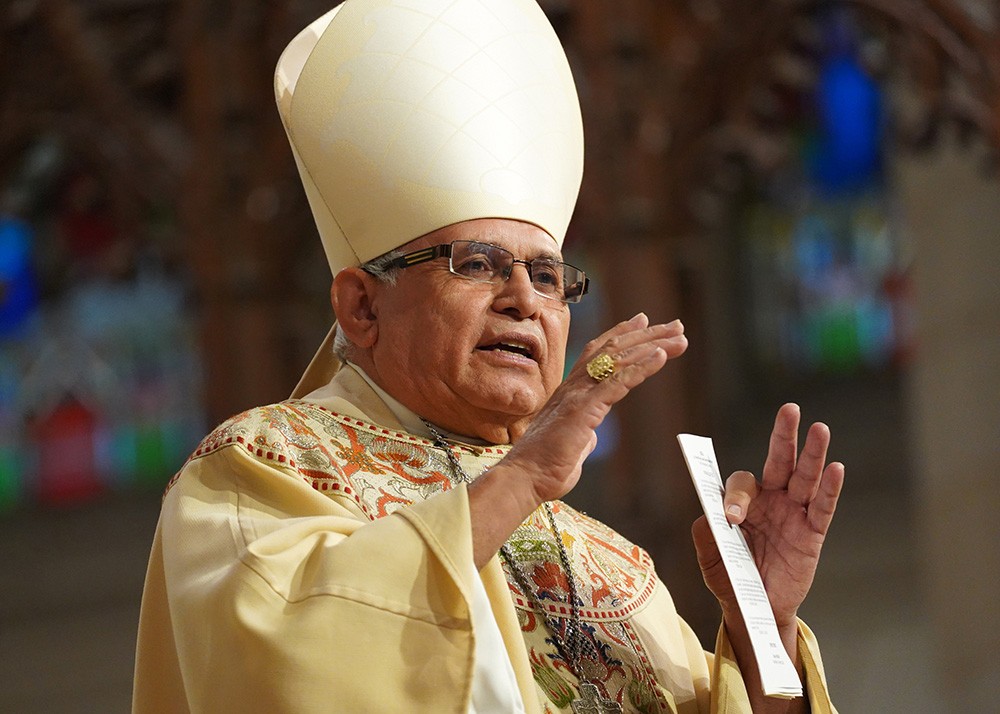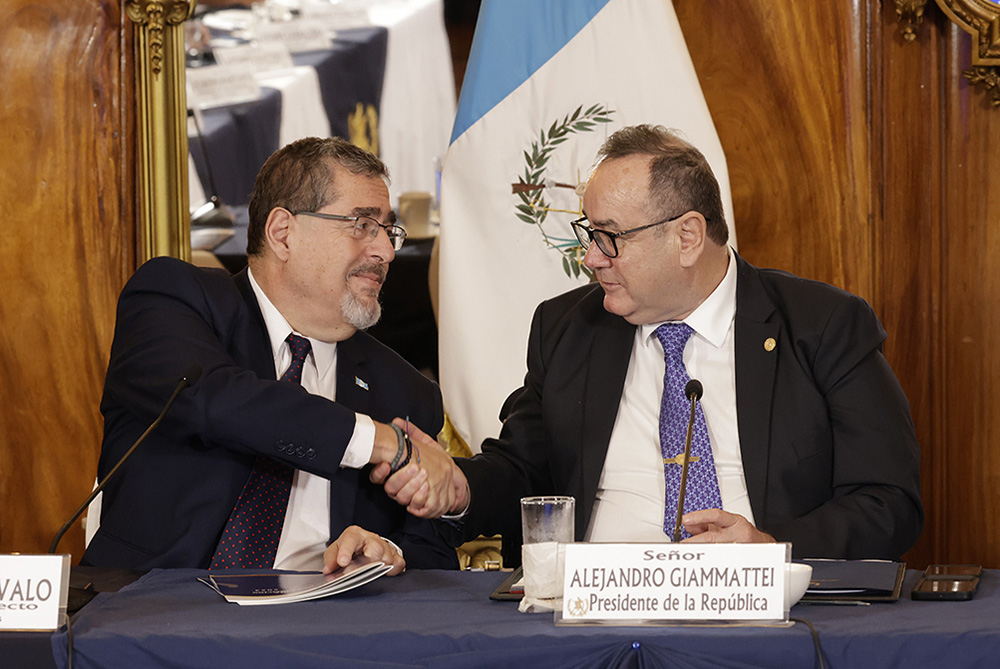
Cardinal Álvaro Ramazzini of Huehuetenango, Guatemala, delivers his homily as he celebrates a special Mass in honor of the Black Christ of Esquipulas, Guatemala, Jan. 5, 2020, at St. Patrick's Cathedral in New York City. (CNS/Gregory A. Shemitz)
Catholic leaders and organizations in Latin America are lining up to support a Guatemalan cardinal rumored to be a target for arrest after voicing concerns that political forces are trying to prevent a democratically elected president from being sworn in Jan. 14, 2024.
On a recent radio show, Cardinal Álvaro Ramazzini, of the Huehuetenango Diocese, said he'd heard the Guatemalan government had sent a "strong letter" against him to the Vatican. Rumors of a warrant for his arrest have circulated since his vocal concerns that a coup is in the works to prevent Guatemalan President-elect Bernardo Arévalo from taking over.
"The fear is that there could be a type of political coup d'état in which the president-elect will not be allowed to take possession [of the presidency]," Ramazzini told National Catholic Reporter Nov. 9 during a visit to Washington, in which he spoke to different organizations about those concerns.
During that visit, he met with Luis Almagro, secretary general of the Organization of American States, as well as U.S. State Department and White House officials who are closely watching the goings-on in Guatemala.
He also celebrated Mass in a chapel at the Basilica of the National Shrine of the Immaculate Conception Nov. 10. The Mass was attended by human rights defenders; representatives from the Hope Border Institute; family members of victims of Guatemala's civil war; and El Paso, Texas, Bishop Mark Seitz, chairman of the U.S. Conference of Catholic Bishops' migration committee.
Advertisement
Following that visit, Ramazzini was fiercely attacked by anonymous accounts on social media and elsewhere, saying he shouldn't be meddling in politics, depicting him with horns coming out of his biretta, and calling him bad words.
In a Dec. 4 statement, the Latin American bishops' conference, known as CELAM, expressed "solidarity" with Ramazzini, "in the face of the false information that has been spread in recent days and that constitutes an attack on his dignity and moral integrity."
Supporting the poor in their quest for just demands "is the mission of the entire Church and that is why we stand alongside Cardinal Ramazzini, echoing his struggles and concerns," the CELAM statement said.
Others, including the Churches and Mining Network; the National Convergence of Resistance; and Red CLAMOR, which deals with human trafficking, immigration and refugees, all quickly published statements supporting the cardinal.
It's hard to say whether his November visit to Washington caused the recent threats and rumors, although Ramazzini, called "a witness of the Gospel of Jesus Christ incarnated in the poorest" by CELAM, has long denounced the country's corruption.
On Aug. 20, Guatemalans tired of institutional political parties and their corruption elected Arévalo, a former diplomat, who heads the outsider Semilla Movement, as their next president. And though current President Alejandro Giammattei has called for a peaceful transition, Guatemala's ruling party — using the courts –— has been involved in a series of maneuvers that seem to be attempting to prevent Arévalo from taking office.
Efforts have been made to suspend the Semilla Movement and to prosecute the president-elect and his vice president for tweets made more than two years ago, encouraging a student protest. There were no concerns raised about the old tweets before he was elected.
These moves against Arévalo "raise many doubts and arouse much suspicion. And therefore, the least we can do is draw attention," Ramazzini told NCR.

Guatemalan President-elect Bernardo Arévalo, left, shakes hands with current President Alejandro Giammattei during a transition meeting in Guatemala City Sept. 4. (Wikimedia Commons/Gobierno de Guatemala)
In his homily at Washington's Marian shrine, after a Gospel reading from a letter from St. Paul to the Romans, Ramazzini spoke about corruption.
"I asked myself this question: What is the root of corruption?" he said. "The root is ambition ... an exaggerated individualism. 'I don't care about the others. I only care about me.' "
Ramazzini said during the homily that some governments and private industry are complicit, even as they "could do so much in favor of people, if they could have a little solidarity, if they could be just a little generous."
A Christian must seek the good of all, he said. Those who opt for "egoism" and an attitude of "me, me, me and me" belong to the world of power, money and disorder, he said.
"This confronts us to wonder: What kind of Christian am I? What kind of Christian life do I practice and seek?"
Ramazzini left Guatemala in early December for a meeting with the German relief organization Adveniat. Rumors quickly began that he had left the country fearing arrest.
But in a radio show posted on YouTube Dec. 6, he says he's expecting to soon return home. He also says he's continued to speak in Germany about what is going on in the country and was told by a Guatemalan public ministry official that there was no arrest warrant.
El Paso's Seitz, who accompanied Ramazzini in his meetings to Washington, told NCR Nov. 9 that the upcoming transition marks "a key moment in the history of Guatemala."
"They have an opportunity to restore a truly democratic government that follows the laws and the constitution," Seitz said. "They have a chance to really deal with corruption, because those coming in are from outside [the ruling parties] and they can begin again. It's a time of great hope in Guatemala, but also, as the cardinal has explained, very serious threats to that."
Ramazzini told NCR that Guatemala is "now in a crisis" in which democracy "will have to be sustained."








